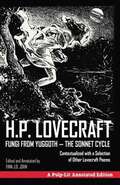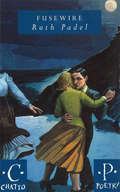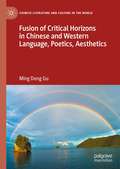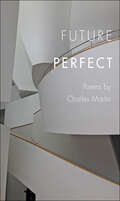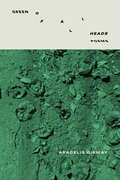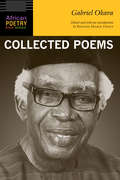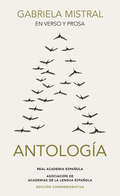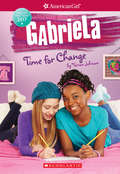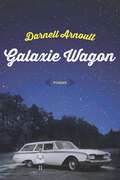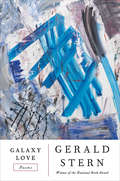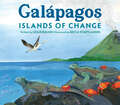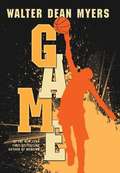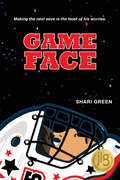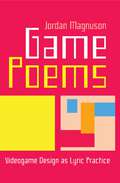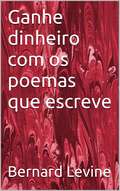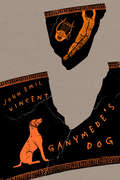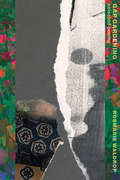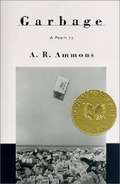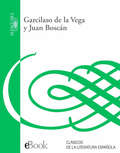- Table View
- List View
Fun on Wheels
by Joanna ColeCome explore the world of wheels! From wheels that cut to wheels that you ride, this book introduces the concept of wheels to young readers.
Fungi From Yuggoth: Contextualized with A Selection of Other Lovecraft Poems
by H. P. Lovecraft Finn J. D. JohnAlthough he’s best known for his works of weird fiction, H.P. Lovecraft for most of his life considered himself primarily a poet. This cycle of 36 classic-form sonnets, infused with his trademark cosmic dread, represents the pinnacle of Lovecraft’s career as a poet, and it’s his most well-known and thoroughly-studied body of poetry. This volume presents Fungi from Yuggoth in the context of Lovecraft’s literary life, with examples of his other poetry. In it, you will discover — or rediscover — the dark humor, bold imagination, and sparkling wit that is Howard Phillips Lovecraft’s enduring gift to the world.
Fusewire
by Ruth PadelFusewire has the fierce historical awareness and linguistic energy of Ruth Padel's previous collections but moves into new territory and new clarity. Poems on British activity in Ireland through the ages intrude on an intensely moving series of love poems which reverse sexual clichés of colonisation: here Britain is female and Ireland the high-profile man.From the prize-winning poet of Rembrandt Would Have Loved You, Voodoo Shop and The Soho Leopard, all shortlisted for the T.S. Eliot Prize.
Fusion of Critical Horizons in Chinese and Western Language, Poetics, Aesthetics (Chinese Literature and Culture in the World)
by Ming Dong GuThis book begins with a reflection on dichotomies in comparative studies of Chinese and Western literature and aesthetics. Critiquing an oppositional paradigm, Ming Dong Gu argues that despite linguistic and cultural differences, the two traditions share much common ground in critical theory, aesthetic thought, metaphysical conception, and reasoning. Focusing on issues of language, writing, and linguistics; metaphor, metonymy, and poetics; mimesis and representation; and lyricism, expressionism, creativity, and aesthetics, Gu demonstrates that though ways of conception and modes of expression may differ, the two traditions have cultivated similar aesthetic feelings and critical ideas capable of fusing critical and aesthetic horizons. With a two-way dialogue, this book covers a broad spectrum of critical discourses and uncovers fascinating connections among a wide range of thinkers, theorists, scholars, and aestheticians, thereby making a significant contribution to bridging the aesthetic divide and envisioning world theory and global aesthetics.
Future Perfect (Johns Hopkins: Poetry and Fiction)
by Charles MartinThe latest dazzling collection of poems from Charles Martin, a modern poet working within the possibilities of traditional measures.To be modern is to live not in a single era, but in a churn of new technologies, deep history, myth, literary traditions, and contemporary cultural memes. In Future Perfect, Charles Martin’s darkly comic new collection, the poet explores our time and the times that come before and after, which we inhabit and cultivate in memory and imagination. Through poems that play with form and challenge expectation, Martin examines the continuities that persist from time immemorial to the future perfect.Sensitive to the traces left behind by the lives of his characters, Martin follows their tracks, reflections, echoes, and shadows. In "From Certain Footprints Found at Laetoli," an ancient impression preserved in volcanic ash conjures up a family scene three million years past. In "The Last Resort of Mr. Kees" and "Mr. Kees Goes to a Party," Martin adopts the persona of the vanished poet Weldon Kees to reimagine his disappearance. "Letter from Komarovo, 1962" retells the tense real-life meeting between Anna Akhmatova and Robert Frost a year before their nations almost destroyed one another. And in the titular sonnet sequence that ends the book, Martin conjures a childhood in the Bronx under the shadow of the mushroom cloud of nuclear war as the perfected future supplanting the present.Introducing Buck Rogers to Randall Jarrell and combining new translations or reinterpretations of works by Ovid, G. G. Belli, Octavio Paz, and Euripides, Future Perfect further establishes Charles Martin as a master of invention.
GREEN OF ALL HEADS
by Aracelis Girmay*The Whiting Award-winning poet returns*Written over the span of a decade, GREEN OF ALL HEADS is a work of formal range and emotional urgency. In the coinciding wakes of tragic loss and new motherhood, Aracelis Girmay examines the entangled temporalities of an aging parent and newly born children. This vital work grapples with what it means to attend to life in the context of corporate industries of birth and death. In language shaped by these pressures, she turns to what is small, unruly, nationless, plural — flowers, speech — to reach toward new relational and political possibility. Away from the fixed and monumental, and toward that which is fleeting, she writes: “— i am learning to lift — my voice — like a flower — in — a field of flowers —” The result is a language broken and emboldened by love.
Gabriel Okara: Collected Poems (African Poetry Book)
by Brenda Marie Osbey Gabriel OkaraGabriel Okara, a prize-winning author whose literary career spans six decades, is rightly hailed as the elder statesman of Nigerian literature. The first Modernist poet of anglophone Africa, he is best known for The Fisherman’s Invocation (1978), The Dreamer, His Vision (2005), and for his early experimental novel, The Voice (1964). <p><p> Arranged in six sections, Gabriel Okara: Collected Poems includes the poet’s earliest lyric verse along with poems written in response to Nigeria’s war years; literary tributes and elegies to fellow poets, activists, and loved ones long dead; and recent dramatic and narrative poems. The introduction by Brenda Marie Osbey contextualizes Okara’s work in the history of Nigerian, African, and English language literatures. Gabriel Okara: Collected Poems is at once a treasure for those long in search of a single authoritative edition and a revelation and timely introduction for readers new to the work of one of Africa’s most revered poets.
Gabriela Mistral en verso y prosa. Antología
by Gabriela MistralLo mejor de la obra de Gabiela Mistral, Premio Nobel de Literatura, en una edición preparada y avalada por la Real Academia Española y la Asociación de Academias de la Lengua Española. Esta antología de Gabriela Mistral, una de las escritoras fundamentales del siglo XX en español, reúne íntegros los cuatro libros de poesía que la autora publicó en vida: Desolación, Ternura, Tala y Lagar. A ellos se suman inéditos poéticos de obras que no llegó a dar a imprenta, tales como Poema de Chile y Lagar II; una selección de otros poemas inéditos y dispersos, y muestras variadas de su prosa. Incluye textos complementarios sobre la autora y su obra de Gonzalo Rojas, Pedro Luis Barcia y Darío Villanueva, entre otros críticos, además de una bibliografía, un repertorio de nombres propios y un glosario. La crítica ha dicho sobre la colección de ediciones conmemorativas:«Un club [la colección de edicionesconmemorativas] que ya cuenta con invitados más que ilustres.»El País «Sean bienvenidas, por muchos motivos, estas ediciones conmemorativas auspiciadas por instituciones académicas del mayor rango. Unas ediciones que, por sus precios populares, y ahora que los buenos libros han pasado a ser un objeto de lujo, facilitan al gran público el acceso a unos autores que, paradójicamente, no por ser -clásicos- de la literatura en lengua castellana (antiguos o modernos) dejan de ser para algunos, aún hoy, unos grandes desconocidos.»El Imparcial
Gabriela Speaks Out: Girl of the Year 2017, Book 2) (American Girl: Girl of the Year 2017 #2)
by Teresa E. HarrisGabriela's second novel picks up where her first left off. Her BFF may be going to another school, but Gabby is determined to make sixth grade the best year ever! She's even ready to stand up to confident and intimidating Aaliyah Reade-Johnson if she makes fun of Gabby for her stutter. What she isn't ready for is Sixth Grade Initiation--a series of pranks the older kids play on the sixth graders. Gabby could stop the tradition if she wins the school election . . . but Aaliyah is running, too, which means Gabby's chances for victory are slim. Can Gabby find the courage to stand on her own, speak out for change, and do what seems impossible?
Gabriela: Time for Change (American Girl #3)
by Varian JohnsonGabby has never been so busy! In this third novel featuring American Girl's 2017 Girl of the Year, Gabby is already juggling homework, school leadership activities, dance classes, and rehearsals for a spoken word competition when she's offered an exciting dance opportunity. It's too good to pass up, but soon, Gabby finds there aren't enough hours in the day to do it all, let alone be a good friend to her BFF, Teagen. And she can't help but notice that more and more, she wishes she were working on her poetry instead of doing pliés and grand jetés. Gabby's changed a lot this past year. By the time the competition rolls around, she begins to wonder--have her dreams changed, too?
Gagaan X'usyee/Below the Foot of the Sun: Poems (The Alaska Literary Series)
by X'unei Lance TwitchellIdentity and understanding are fluid and plural, yet the histories of violence and oppression influence and shape everything in the world because the past, present, and future exist in the same plane and at the same time. Gagaan Xʼusyee / Beneath the Foot of the Sun is a unique collection of Indigenous cultural work and Lingít literature in the tradition of Nora Marks Dauenhauer and in the broader contemporary company of Joy Harjo and Sherwin Bitsui. Focused on the history of place and the Lingít and Haida people, who recognize little separation between life and art, these forty-six poems reach into the knowledge of the past, incorporate visions currently received, and draw a path for future generations. The collection is divided into four sections based on how the Lingít talk about g̱agaan—the sun. Featuring some poems in English, some in Lingít, and some that combine the beauty of the two, Gagaan Xʼusyee / Beneath the Foot of the Sun displays an equal dignity in both languages that transcends monolingual constrictions.
Galaxie Wagon: Poems
by Darnell ArnoultIn Galaxie Wagon, Darnell Arnoult navigates the territory of middle age to find humor, heartbreak, and wisdom in a phase of life where the body begins to betray itself, yet romance is still possible and childhood dreams are still attainable. Deceptively simple yet carefully crafted, these engaging poems teach us how memory and attention point us toward our future and grapple with the great paradox: the undeniable knowledge of the finite and an indefatigable belief in the infinite.
Galaxy Love: Poems
by Gerald SternGalaxy Love showcases the voice of a beloved and acclaimed poet, celebrating the passions and rhythms of life. The poems in this new volume by the winner of the National Book Award span countries and centuries, reflecting on memory, aging, history, and mortality. “Hamlet Naked” traverses Manhattan in the 1960s from a Shakespeare play on 47th Street to the cellar of a Ukrainian restaurant in the East Village; “Thieves and Murderers” encompasses musings of the medieval French poet François Villon and Dwight Eisenhower; “Orson” recounts a meeting of the poet and Orson Welles, exiled in Paris. Gerald Stern recalls old cars he used to drive—“the 1950 Buick / with the small steering wheel / and the cigar lighter in the back seat”—as well as intimate portraits of his daily life “and the mussel-pooled and the heron-priested shore” of Florida. These are wistful, generous, lively love poems and elegies that capture the passage of time, the joys of a sensual life, and remembrances of the past.
Galápagos: Islands of Change
by Leslie BulionA poetic introduction to a distinctive island ecosystem that is home to many species found nowhere else on Earth.Using the same poetry/science note format as Serengeti, Galápagos tells the complex story of a young volcanic ecosystem influenced by seasonal ocean currents, where food energy moves through integrated land and sea communities, each in its own season of growth and renewal.Millions of years ago, undersea volcanos in the eastern Pacific Ocean erupted, spewing up lava, rocks, and ash that eventually formed a cluster of islands: the archipelago known as the Galápagos Islands. Over time, castaway plants and animals from hundreds of miles away arrived on the rocky shores and adapted to each island&’s changing volcanic landscape and seasonal weather variations.In these isolated locations constantly affected by shifting winds and swift ocean currents, much of the wildlife evolved into species found nowhere else on Earth. Some of the many distinctive organisms featured include giant daisy trees, Galápagos penguins, marine iguanas, blue footed boobies, and Galápagos giant tortoises.The well-researched back matter includes poetry notes, a glossary, resources, and a list of the species from this remarkable ecosystem that are highlighted in the book.
Game
by Walter Dean MyersThis thrilling basketball story from New York Times bestselling author Walter Dean Myers is a strong choice for independent reading and sharing in the classroom. Thought-provoking and packed with court action, Game is a winner!Drew Lawson is all about basketball. Everyone in his life knows that his game is taking him places. (It has to, because his grades certainly won’t.) Drew knows how hard it is to make it big, but even with the long odds, he is good enough to have a shot.But when Coach hands the ball to another player—Tomas, a white kid from Europe—Drew can’t help but feel like he’s not the star on the courts anymore. He’s seen enough men in his neighborhood flame out to know that if he wants to be extraordinary, his game has to be the best.As his team makes the playoffs with Tomas on the court, Drew knows he has to come up with a big move to save his fading college prospects. It's all up to Drew to find out just how deep his game really is.Walter Dean Myers was a New York Times bestselling author, Printz Award winner, five-time winner of the Coretta Scott King Award, two-time Newbery Honor recipient, and the National Ambassador for Young People's Literature. Maria Russo, writing in the New York Times, called Myers "one of the greats and a champion of diversity in children’s books well before the cause got mainstream attention."
Game Face
by Shari GreenThirteen-year-old Jonah is determined to prove that anxiety won’t stop him from succeeding as his hockey team’s goalie in this dynamic novel in verse. What-ifs rattle around his brain at the worst times, like when he’s in the middle of a playoff game. What if he lets his teammates down? What if he can’t make it pro? And the biggest what-if of all, the one he keeps to himself — what if he’s like his dad, whose life is controlled by anxiety that has only gotten worse since Jonah’s mom died in a car crash? To prove that he’s not like that, Jonah is determined to succeed in the high-stress role of goalie. He and his best friend Ty have big plans for their hockey futures. But when Ty suffers a medical crisis during a pivotal game, Jonah’s anxiety ramps up to new levels It takes courage to ask for help, but Jonah starts to realize that his team goes beyond the people who lace up their skates with him every week, and maybe it’s okay to look for support on and off the ice. From the adrenaline rush of sudden-death overtime to the weight of worrying about letting your teammates — and yourself — down, this novel in verse will hook readers from the first line. Key Text Features dialogue poems Correlates to the Common Core State Standards in English Language Arts: CCSS.ELA-LITERACY.RL.4.3 Describe in depth a character, setting, or event in a story or drama, drawing on specific details in the text (e.g., a character's thoughts, words, or actions). CCSS.ELA-LITERACY.RL.4.5 Explain major differences between poems, drama, and prose, and refer to the structural elements of poems (e.g., verse, rhythm, meter) and drama (e.g., casts of characters, settings, descriptions, dialogue, stage directions) when writing or speaking about a text. CCSS.ELA-LITERACY.RL.5.4 Determine the meaning of words and phrases as they are used in a text, including figurative language such as metaphors and similes.
Game Poems: Videogame Design as Lyric Practice
by Jordan MagnusonScholars, critics, and creators describe certain videogames as being “poetic,” yet what that means or why it matters is rarely discussed. In Game Poems: Videogame Design as Lyric Practice, independent game designer Jordan Magnuson explores the convergences between game making and lyric poetry and makes the surprising proposition that videogames can operate as a kind of poetry apart from any reliance on linguistic signs or symbols. This rigorous and accessible short book first examines characteristics of lyric poetry and explores how certain videogames can be appreciated more fully when read in light of the lyric tradition—that is, when read as “game poems.” Magnuson then lays groundwork for those wishing to make game poems in practice, providing practical tips and pointers along with tools and resources. Rather than propose a monolithic framework or draw a sharp line between videogame poems and poets and their nonpoetic counterparts, Game Poems brings to light new insights for videogames and for poetry by promoting creative dialogue between disparate fields. The result is a lively account of poetic game-making praxis. “Everyone who loves the true power of games will benefit from the treasure trove of insights in Game Poems.” — Jesse Schell, author of The Art of Game Design “Magnuson shines a sensitive and incisive light on small, often moving, videogames.” — D. Fox Harrell, Ph.D., Professor of Digital Media, Computing, and Artificial Intelligence, MIT “[Game Poems] tells a new story about games— that games can be lyrical, beautiful, emotionally challenging—to inspire creators and critics alike.” —Noah Wardrip-Fruin, author of How Pac-Man Eats “Even as the news swells with impending doom for creativity, writing, and text itself, this literate and crafty book pursues poetry not through implacable algorithms but in concrete and personal play. It should be an indispensable guide for anyone who aims to maintain the true, human promise of technical poetics.”—Stuart Moulthrop, coauthor of Twining: Critical and Creative Approaches to Hypertext Narratives “For far too long videogames have flourished – and commanded both capital and attention – in a kind of counterculture that they seem to have created as if ex nihilo for themselves and their players. But we are these players, and their culture has always been integrated with all of our own. In this evenhanded artist-scholar’s ars poetica Jordan Magnuson respects the material cultural specificity of videogames while regarding them through the ‘lens of poetry’ in order to discover – and help create – a practice and an art of Game Poems within the wider field. Magnuson formally, int(erv)entionally embraces this art as lyrically poetic.”—John Cayley, Brown University “In Game Poems, Magnuson listens carefully to videogames, and hears them speak to questions of art, language, and meaning that connect our written past to our software future. Read this book and you will hear it too.”—Frank Lantz, Director, NYU Game Center “Jordan Magnuson has created a work that ties together the worlds of poetry and videogames in a deep and enlightening way. For those of us who care about the potential of poetic games, Jordan greatly improves the language of how we talk about them and expands our ability to see what this unique form can become. This is one of my favorite books on game design and I apologize in advance to those whom I will end up cornering and not being able to stop talking to about it.”—Benjamin Ellinger, Game Design Program Director, DigiPen Institute of Technology “A groundbreaking and accessible book that helps us think about games as poems. With patient tenacity, Magnuson teases out what he felt for years as he engaged in his own practice of making videogames. His mission to help us apply a ‘
Gangster Love
by J. T. MarieShort chapbook of 24 poems which center around outlaws, gangsters, robbers, gunslingers, and thieves. On loving criminals in spite of, and sometimes because of, their crimes. Set in the Old West or Small Town America, each poem is a story of love. Think Billy the Kid and Pat Garrett, or Bonnie and Clyde ... these poems celebrate the allure and romance in such doomed relationships.
Ganhe dinheiro com os poemas que escreve
by Bernard Levine Flavia MachadoVocê escreve poesias? Agora você pode ganhar dinheiro com os poemas que escreve e publicá-los em cartões comemorativos, calendários, posters e placas para paredes. Caso você queira realizar o sonho de se tornar escritor e ganhar dinheiro com poesia, este livro é exclusivo e foi feito especialmente para você. Escrever poesia para ganhar dinheiro é super divertido e muito lucrativo! Ganhe dinheiro fazendo o que ama.
Ganymede's Dog (Hugh MacLennan Poetry Series #50)
by John Emil VincentTook all this time to actually in fact bite our own tail to learn that that hurts; I guess it was worth it. / Developed a taste for tails. The prose poems of Ganymede's Dog startle myths back to life, whether Ganymede's abduction by Zeus in the form of an eagle, his abduction by a century's worth of Budweiser labels, Sophocles's boozy boy-chasing, or the dancing plague of 1518. John Emil Vincent teases his materials into surreal, joyous, dirty, sometimes gruesome animation. His revelations arrive in the guise of other characters, and throughout, there are dogs. Dog-themed philosophy, dog-headed saints, dog-worshipping island rituals, and just plain dogs invite the reader to puppy-pile with Petronius, Catherine the Great, and Saint Christopher in a sapiosexual orgy with autocorrect handling the towels. Deeply infused with gay culture and mythology, Ganymede's Dog is a collection of smart, knowing, allusive, often ironic poems that ponder the boundaries of legend and the privileges of youth and beauty.
Ganymede's Dog (Hugh MacLennan Poetry Series #51)
by John Emil VincentTook all this time to actually in fact bite our own tail to learn that that hurts; I guess it was worth it. / Developed a taste for tails. The prose poems of Ganymede's Dog startle myths back to life, whether Ganymede's abduction by Zeus in the form of an eagle, his abduction by a century's worth of Budweiser labels, Sophocles's boozy boy-chasing, or the dancing plague of 1518. John Emil Vincent teases his materials into surreal, joyous, dirty, sometimes gruesome animation. His revelations arrive in the guise of other characters, and throughout, there are dogs. Dog-themed philosophy, dog-headed saints, dog-worshipping island rituals, and just plain dogs invite the reader to puppy-pile with Petronius, Catherine the Great, and Saint Christopher in a sapiosexual orgy with autocorrect handling the towels. Deeply infused with gay culture and mythology, Ganymede's Dog is a collection of smart, knowing, allusive, often ironic poems that ponder the boundaries of legend and the privileges of youth and beauty.
Gap Gardening: Selected Poems
by Rosmarie WaldropAn essential edition of a major avant-garde poet: “Waldrop compels us to seek out new superlatives” (Ben Lerner, Jacket) Rosmarie Waldrop says Gap Gardening “spans forty years of exploring the language I breathe and move in and that continues to condition me even while I try to contribute to it. It tracks my turn from verse to prose poems, to focusing on the sentence and its boundaries, my increasing reliance on collage and source texts as a way of engaging with other voices, of being in dialogue.” Gap Gardening also traces Waldrop’s growing sense of writing as an exploration of what happens in between. Between words, sentences, people, cultures. Between fragment and flow, thinking and feeling, mind and body. For the first time, we have a complete and clear view of the work of a great and inquiring, brave and indispensable poet.
Garbage: A Poem
by A. R. AmmonsA book-length poem, "Garbage" is an epic of ideas: all life -- not that of human beings alone, but every species -- is shown to be part of an ultimate reality. Eternity is here and now. The argument ranges widely with a wealth of images taken from science, and the world around us, the writing by turns impassioned and witty. <P><P> Winner of the National Book Award
Garbhagriha (The Dark Sanctum)
by Ravi Nandan Sinha Saswat S. Das Haraprasad DasThe Dark Sanctum: English translation by Ravi Nandan Sinha and Saswat S. Das of Haraprasad Das's award-winning Oriya poetry collection Garbhagriha.
Garcilaso de la Vega y Juan Boscán
by Garcilaso De la Vega Juan BoscánJuan Boscán introdujo las formas y los temas de la lírica que habían triunfado en Italia, lo que señala el final de nuestra poesía medieval y el inicio de la renacentista. Garcilaso continúa ese camino con genialidad, por lo que ha sido admirado por los poetas de todos los tiempos. Su poesía es culta y refinada, pero al tiempo sencilla y musical: #Coged de vuestra alegre primavera / el dulce fruto, antes que el tiempo airado / cubra de nieve la hermosa cumbre#.

